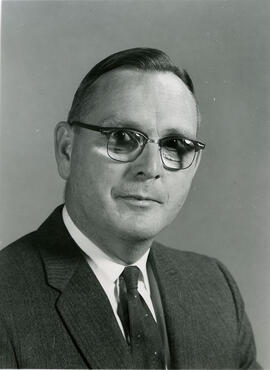Head and shoulders image of J. Howard Richards, Professor and Head, Department of Geography.
Bio/Historical Note: J. Howard Richards was born 21 May 1916 in Caerphilly, Wales. He enrolled at the University of Wales in 1934 and graduated in 1938 with a B.Sc. in Geography. Richards remained in Wales the following year to teach at a private school and spent the next two years as a Meteorologist in the United Kingdom and Canada. He joined the Royal Canadian Army, serving in Europe from 1942-1946. After his discharge, Richards enrolled at the University of Toronto; in 1947 he received his MA. Richards taught at Utica College of Syracuse University and the University of Manitoba before returning to the University of Toronto, where he earned his PhD in 1956. He briefly joined the staff of the Royal Military College of Canada prior to coming to the University of Saskatchewan in 1960 as Professor and Head of the newly formed Department of Geography. He was to remain in that post until his retirement in 1979. He was named Professor Emeritus in 1983. During his tenure, Richards developed academic programs in Geography and the interdisciplinary programs of Land Use, Environmental Studies and Regional and Urban Development and Planning. He was the editor of the first "Atlas of Saskatchewan" and the author of "Saskatchewan Geography" and "Saskatchewan: A Geographical Appraisal," among other publications.



